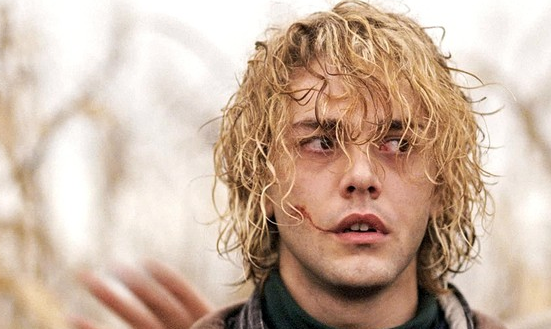Xavier Dolan’s fourth film (and only now at the still tender age of twenty-six), Tom at the Farm, is the sort of narrative that might spring from the combined mind of Jean Genet and Bret Easton Ellis. Adapted from Canadian playwright Michel Marc Bouchard’s play, the tale is a careful study in how easily one can be converted into another’s questionable psychosis.

After the death of his boyfriend, Guillaume (who may or may not have committed suicide), Tom (played by Dolan himself), heads to the rural farm where his family lives to attend the funeral. To his shock and dismay, no one has any idea who he is, and yet, Guillaume’s mother, Agathe (Lise Roy), is all too inviting, assuming he’s a good friend of Guillaume’s who came to pay his respects. So trusting is she of the nature of his relationship that she even asks–demands–that he give a speech at his funeral. Not only is Tom off-put by this, but also by the information that Guillaume has a brother, Francis (Pierre-Yves Cardinal).

He is given an abrupt introduction to him while sleeping in Guillaume’s former bed–his slumber interrupted by Francis threateningly crawling on top of him and growling, “I thought you’d be stopping by. I fucking knew it.” Insisting that Tom keeps his mouth shut about any sort of romance he had with Guillaume, Francis instructs him to give his speech and leave their home at once after the funeral. When Tom can’t find the strength to do it, Francis corners him in the bathroom and seethes, “We’re going on holiday to Ajaccio tonight.” He is quoting what Tom said to Guillaume over the phone once, revealing that he recognized his voice from long ago. This is one of the many ways in which it seems Francis has been waiting a long time for Tom to materialize.

Suddenly, Francis is adamant that Tom stays at the farm to make his mother feel better about not giving the speech. He tells Tom to talk about Guillaume’s pretend girlfriend, Sara Thibault (Évelyne Brochu). When Francis mentions her first name, he instantly intuits that it is a co-worker of theirs who works at Tom’s ad agency back in Montreal (though he doesn’t seem too preoccupied with his job while in the alternate universe of the farm). Tom’s pang of jealousy is augmented when Francis shows a picture of Guillaume and Sara kissing. When he rages about confessing everything to Agathe, Francis chases him through the cornfields and beats him to a pulp in what is arguably one of Dolan’s most iconic scenes to date.

Francis’ tough guy persona, which starts out innocently enough with roguish dialogue like, “I don’t care about people, so people don’t care about me,” quickly transmutes into something far more sinister–and Tom kind of digs it. Francis’ desire for Tom to stay takes a macabre turn when he removes all of the tires from Tom’s car. He soon falls easily into a rapport wherein his role is as the submissive, that is, until Francis kills the calf that Tom helped bring to life, prompting Tom to call in a favor from Sara and bring her to the farm for Agathe to meet Guillaume’s so-called girlfriend.

The situation continues to grow more sinister from there, with Francis now taking a sexual interest in Sara as well, as though wanting desperately to imitate the bedroom patterns of his brother. After Francis tells Tom to leave him alone in the car with Sara at the bus station, he ambles into a bar called, ironically, Les vraies affaires (The Real Thing). It is there that he strikes up a conversation with the bartender and tells him he’s staying on the Longchamp farm. Disturbed by this information, the bartender informs Tom of the violent reason why Francis is banned from Les vraies affaires. Yet again, it all goes back to Guillaume, and the incredible power of cause and effect he has on those around him. In the end, it’s the sort of hold that never lets go–channeled brutishly through Francis–even in death.





















[…] recently directing the claustrophobic, thriller-like love story Tom at the Farm, it’s only natural that prolific director Xavier Dolan would want to continue to stay in the […]